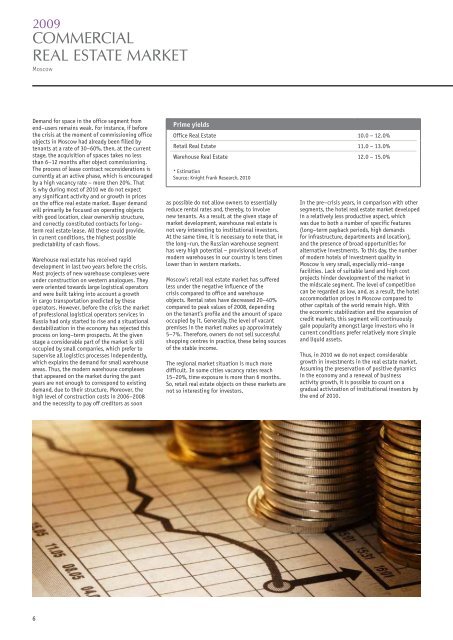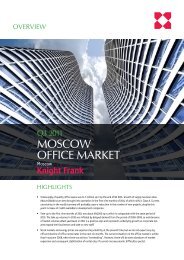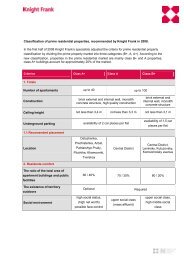COMMERCIAL REAL ESTATE MARKET - Knight Frank
COMMERCIAL REAL ESTATE MARKET - Knight Frank
COMMERCIAL REAL ESTATE MARKET - Knight Frank
Create successful ePaper yourself
Turn your PDF publications into a flip-book with our unique Google optimized e-Paper software.
2009<br />
Commercial<br />
real estate market<br />
Moscow<br />
Demand for space in the office segment from<br />
end–users remains weak. For instance, if before<br />
the crisis at the moment of commissioning office<br />
objects in Moscow had already been filled by<br />
tenants at a rate of 30–60%, then, at the current<br />
stage, the acquisition of spaces takes no less<br />
than 6–12 months after object commissioning.<br />
The process of lease contract reconsiderations is<br />
currently at an active phase, which is encouraged<br />
by a high vacancy rate – more then 20%. That<br />
is why during most of 2010 we do not expect<br />
any significant activity and or growth in prices<br />
on the office real estate market. Buyer demand<br />
will primarily be focused on operating objects<br />
with good location, clear ownership structure,<br />
and correctly constituted contracts for long–<br />
term real estate lease. All these could provide,<br />
in current conditions, the highest possible<br />
predictability of cash flows.<br />
Warehouse real estate has received rapid<br />
development in last two years before the crisis.<br />
Most projects of new warehouse complexes were<br />
under construction on western analogues. They<br />
were oriented towards large logistical operators<br />
and were built taking into account a growth<br />
in cargo transportation predicted by these<br />
operators. However, before the crisis the market<br />
of professional logistical operators services in<br />
Russia had only started to rise and a situational<br />
destabilization in the economy has rejected this<br />
process on long–term prospects. At the given<br />
stage a considerable part of the market is still<br />
occupied by small companies, which prefer to<br />
supervise all logistics processes independently,<br />
which explains the demand for small warehouse<br />
areas. Thus, the modern warehouse complexes<br />
that appeared on the market during the past<br />
years are not enough to correspond to existing<br />
demand, due to their structure. Moreover, the<br />
high level of construction costs in 2006–2008<br />
and the necessity to pay off creditors as soon<br />
Prime yields<br />
Office Real Estate 10.0 – 12.0%<br />
Retail Real Estate 11.0 – 13.0%<br />
Warehouse Real Estate 12.0 – 15.0%<br />
* Estimation<br />
Source: <strong>Knight</strong> <strong>Frank</strong> Research, 2010<br />
as possible do not allow owners to essentially<br />
reduce rental rates and, thereby, to involve<br />
new tenants. As a result, at the given stage of<br />
market development, warehouse real estate is<br />
not very interesting to institutional investors.<br />
At the same time, it is necessary to note that, in<br />
the long–run, the Russian warehouse segment<br />
has very high potential – provisional levels of<br />
modern warehouses in our country is tens times<br />
lower than in western markets.<br />
Moscow’s retail real estate market has suffered<br />
less under the negative influence of the<br />
crisis compared to office and warehouse<br />
objects. Rental rates have decreased 20–40%<br />
compared to peak values of 2008, depending<br />
on the tenant’s profile and the amount of space<br />
occupied by it. Generally, the level of vacant<br />
premises in the market makes up approximately<br />
5–7%. Therefore, owners do not sell successful<br />
shopping centres in practice, these being sources<br />
of the stable income.<br />
The regional market situation is much more<br />
difficult. In some cities vacancy rates reach<br />
15–20%, time exposure is more than 6 months.<br />
So, retail real estate objects on these markets are<br />
not so interesting for investors.<br />
In the pre–crisis years, in comparison with other<br />
segments, the hotel real estate market developed<br />
in a relatively less productive aspect, which<br />
was due to both a number of specific features<br />
(long–term payback periods, high demands<br />
for infrastructure, departments and location),<br />
and the presence of broad opportunities for<br />
alternative investments. To this day, the number<br />
of modern hotels of investment quality in<br />
Moscow is very small, especially mid–range<br />
facilities. Lack of suitable land and high cost<br />
projects hinder development of the market in<br />
the midscale segment. The level of competition<br />
can be regarded as low, and, as a result, the hotel<br />
accommodation prices in Moscow compared to<br />
other capitals of the world remain high. With<br />
the economic stabilization and the expansion of<br />
credit markets, this segment will continuously<br />
gain popularity amongst large investors who in<br />
current conditions prefer relatively more simple<br />
and liquid assets.<br />
Thus, in 2010 we do not expect considerable<br />
growth in investments in the real estate market.<br />
Assuming the preservation of positive dynamics<br />
in the economy and a renewal of business<br />
activity growth, it is possible to count on a<br />
gradual activization of institutional investors by<br />
the end of 2010.<br />
6







![[PDF] ÐÑогÑамма меÑоÐÑиÑÑÐ¸Ñ - Knight Frank](https://img.yumpu.com/43099779/1/184x260/pdf-n-3-4-n-1-4-1-4-1-4-un-3-4-nnnn-knight-frank.jpg?quality=85)
![[PDF] Ð Ñнок коммеÑÑеÑкой недвижимоÑÑи - Knight Frank](https://img.yumpu.com/36235407/1/184x260/pdf-n-1-2-3-4-3-4-1-4-1-4-unnun-3-4-1-2-u-1-4-3-4-nn-knight-frank.jpg?quality=85)
![[PDF] ÐлиÑÐ½Ð°Ñ Ð¶Ð¸Ð»Ð°Ñ Ð½ÐµÐ´Ð²Ð¸Ð¶Ð¸Ð¼Ð¾ÑÑÑ - Knight Frank](https://img.yumpu.com/35569291/1/184x260/pdf-n-1-2-n-n-1-2-u-1-4-3-4-nnn-knight-frank.jpg?quality=85)
![[pdf] ÑÑнок оÑиÑной недвижимоÑÑи - Knight Frank](https://img.yumpu.com/34340947/1/184x260/pdf-nn-1-2-3-4-3-4-nn-1-2-3-4-1-2-u-1-4-3-4-nn-knight-frank.jpg?quality=85)

![[PDF] СкладÑкой ÑÐµÐ³Ð¼ÐµÐ½Ñ - Knight Frank](https://img.yumpu.com/31048046/1/184x260/pdf-n-3-4-nu-1-4-u-1-2-n-knight-frank.jpg?quality=85)



